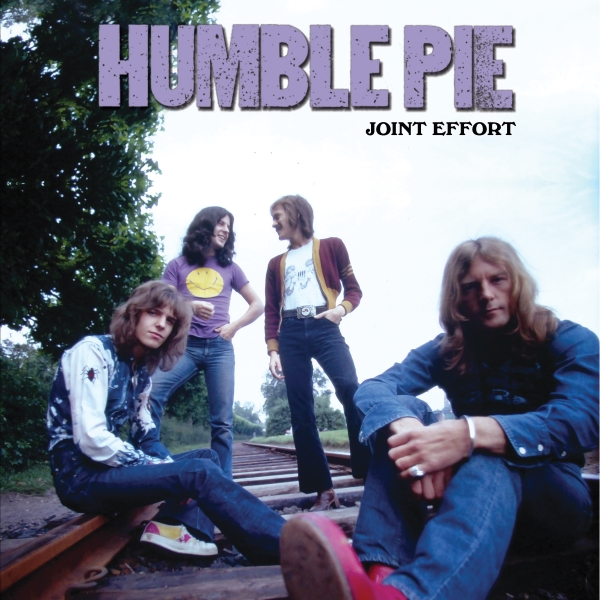An In-depth Interview with John Blangero, Sun King Rising and Harlequin Reborn
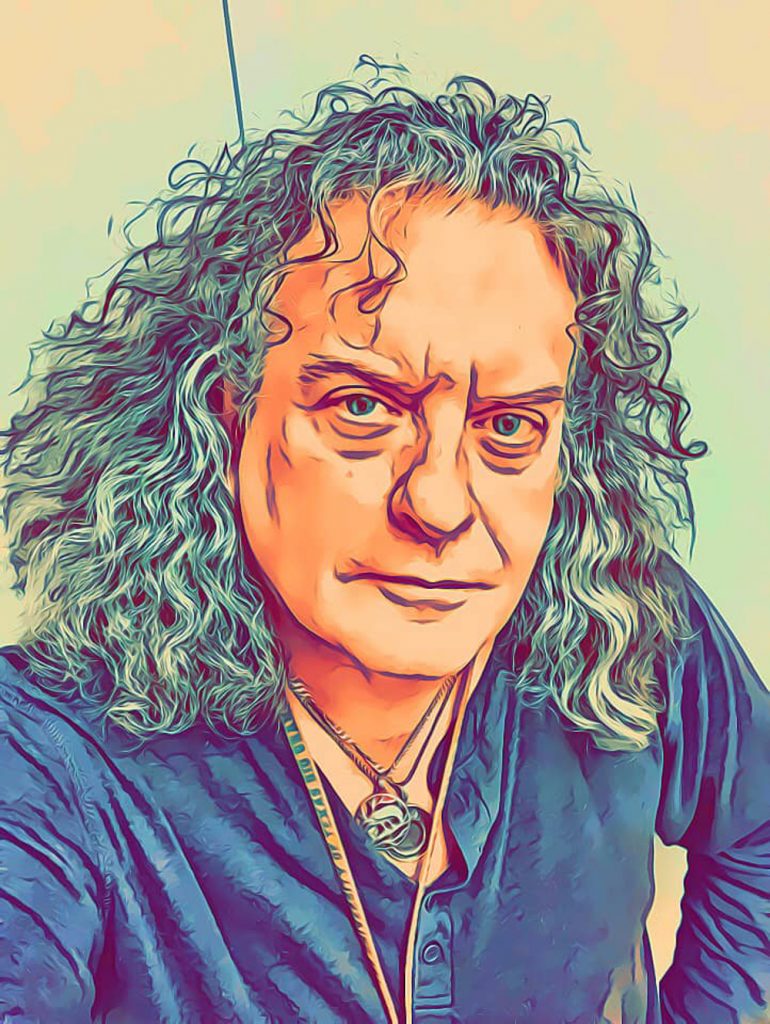
PoP:
Thank you for sitting down with us here at Power of Prog.
John:
Thank you. It is a privilege!
PoP:
Tell us a little about yourself, your musical training?
John:
I started taking piano lessons when I was five years old but stopped at around ten years of age. My teacher, a wonderful elderly woman, would only let me play classical music and hymns…but it introduced me to some gospel-type playing. I then did not play much until I was about 14 when I got into my first rock band. At that point, I returned to the piano and taught myself all about chords so that I could start to write music. In college, I took a few music theory courses and I continue to learn to this day.
PoP:
How long have you been a professional musician, and who or what inspired you to become a musician?
John:
My first inspiration to get into a band came from artists like the Beatles, the Rolling Stones, Joe Cocker, Leon Russell, Humble Pie, Deep Purple, and many others. My first paid gig was when I was 15 in a band named Anxiety’s Moment. It was a good introduction because most of the band were at least 4 years older and experienced. I fronted that band as lead vocalist but didn’t play keyboards. We did a lot of Uriah Heep and Deep Purple. After that I started to get into prog-rock bands like King Crimson, Genesis, Yes, and ELP, which led me and my close friend, guitarist Ron Dominicis, to start bands that largely did original material. That culminated in the formation of a band named Harlequin (currently renamed Harlequin Reborn) that booked out of Pittsburgh and played the Pennsylvania/Ohio/West Virginia market. That band was a combination of prog and glam with a lot of theatrics. I gave up on music for quite a while to get my Ph.D. and become an active biomedical research scientist. After a twenty-year hiatus, I started playing with other musicians in blues bands in San Antonio where I rediscovered my love of the piano, songwriting and playing live.
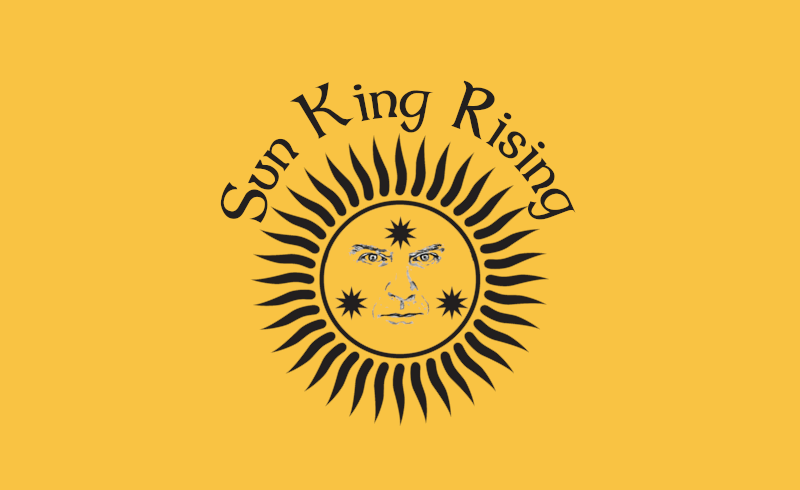
PoP:
You are working on your debut album with your band Sun King Rising an Americana Rock band, can you tell us a bit about the album? For example who is on the album?
John:
Sun King Rising is just what I call my solo non-prog project versus being a full-blown band, although it is likely that I will put a band together around it. This album is really focused on my love of more organic rock music like that of Joe Cocker, Leon Russell, early Elton John, Dan Penn, and a host of others. It reflects my love of southern rock and country soul. The album is called Delta Tales because it focuses on southern themes and I live in the Texas delta of the Rio Grande Valley. I have a lot of great musicians on this album. Steve Acker, from the great 70s band LAW, is producing. He also plays guitar and provides background vocals. Without Steve, this album would not be getting done as fast or be as good as we think it is. My cousin, Steve Schuffert, is playing lead guitar on the album. He is an amazing musician who spent a lot of time in Nashville as a session musician as well as producing quite a few albums as a solo artist or as part of his blues band. David Granati of the Granati Brothers is also playing some guitar, as well as doing some of the engineering. The drummers include George Perilli who played extensively with Michael McDonald, John Sferra of the incredible band, Glass Harp, Andy Taravella of the ADD Band, and Mark Francis who is my drummer from Harlequin Reborn. The bass players include Jeff Bremer, Bambo Kino, and Eddie Costa (also of Harlequin Reborn). Hermie Granati, also of the Granati Brothers, provides some additional very soulful keys. Jacob Wynne wrote the horn charts and provides the talents of the fantastic Cold City Horns. Katherine O’Neill also plays some pretty violin parts on it. Most of these players are from the Pittsburgh and Northeast Ohio area where I grew up. There are also some fabulous back-up vocals by great singers such as Shawn Mayer of Nashville.
PoP:
Who writes your songs? What are the main themes or topics for most of your songs? Do you think these topics will change over time?
John:
I’ve written most of the songs on the album. Steve Acker is contributing an additional two songs and Steve and I have co-written another. While not a concept album, Delta Tales is thematically coherent. It is about the southern experience. The songs reflect vignettes of love found, love lost, family, faith, historical burden, betrayal, sin, and redemption set in a southern cultural landscape. The root subjects are pretty universal.
PoP:
What makes a song stand the test of time such as The Beatles’ Let It Be?
John:
The song needs to have a great hook and it needs to connect to the listener emotionally. Most of the great classics have these features. Take the songs of the truly great songwriter, Jimmy Webb. A song like Wichita Lineman paints a picture that draws the listener in and then imprints it in memory with an awesome melody. The true greats of Americana songwriting like Randy Newman and Leon Russell have this ability. They are literate, melodic, harmonically interesting, and classically memorable. Their songs are strongly evocative, loaded with atmosphere, and can mean different things to different people.
PoP:
What is the creative process like?
John:
It varies quite a bit. Usually, a song comes to me when I’m sitting at my Yamaha grand piano and playing, which I try to do for at least an hour a day. I’ll develop a chord progression and a melody. Sometimes, I’ll already have a lyrical theme in mind or even a title. I keep a document filled with phrases that I come up with that I can incorporate in songs. The Sun King Rising songs tend to be simpler and shorter, of course, than what I write for Harlequin Reborn.
PoP:
Where do you sing besides the studio or a live performance?
John:
I sing in the car a lot when I’m working out phrasing! Also, I’ve been known to go out to do competitive karaoke.
PoP:
What instruments do you play?
John:
I mainly think of myself as a singer/songwriter but the piano is my number one instrument that I connect with the most strongly. I’m not bad at playing Hammond organ either. I play both on the SKR album. Of course, I play lots of other keyboards in HR including various synths and my prize mellotron.
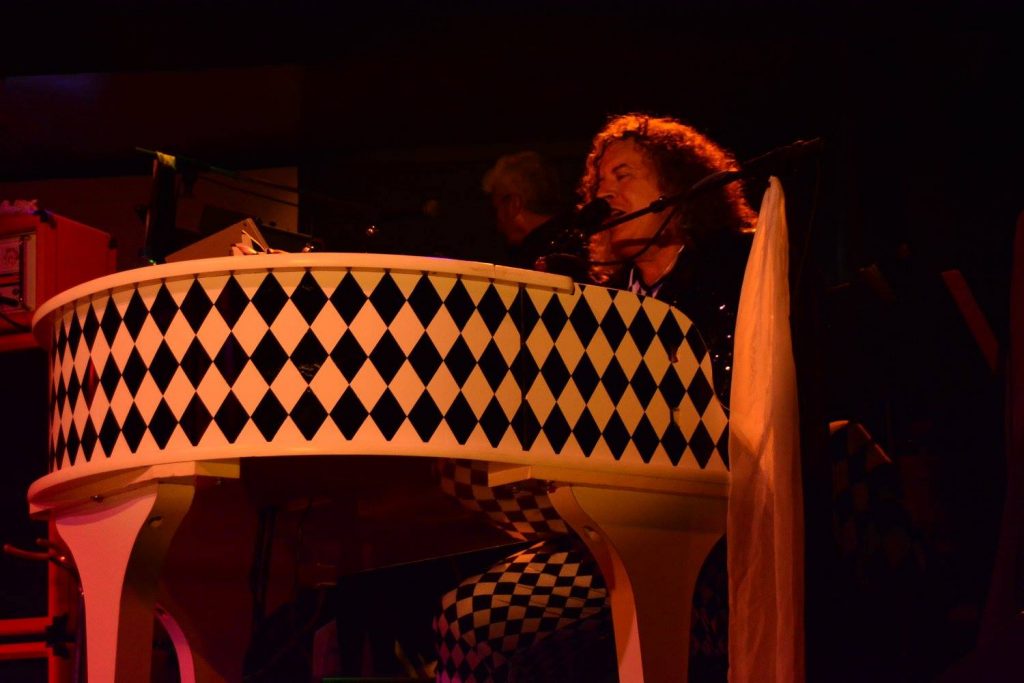
PoP:
What is the most trouble you’ve ever gotten into as a musician?
John:
Ha! Luckily, I’ve not been in much trouble at all.
PoP:
What was the most memorable time in your music career?
John:
It probably has been working on the Delta Tales album. It has been a truly wonderful experience to work with such great musicians. The first Harlequin Reborn reunion show in 2015 also was awesome.
PoP:`
How about a track by track break down?
John:
Sure. We are still working out the exact list and running order of songs. Because we want to put it out on vinyl also, we have some physical constraints that remain to be worked out. Beneath the Southern Sun is a new song that I wrote for the album that is a real rocker and features a jaw-dropping guitar solo by Steve Schuffert. It is a song about a fictional southern family’s history. Let There Be Light is a song with a hope-filled message that I probably wrote 10+ years ago. It is also up-tempo and has a pretty good hook in it. Milkweed and Thistle is one of my favorites. It’s a new song about loss but still rocks and probably has my favorite lyric on the album. It has the flavor of an early Elton John song when he was in his more country period. Horns play an important role in several songs since I am a big fan of those powerful horn sections heard so often on southern soul records. Love Turns Grey is a Leon Russell-Esque funky song that has some awesome horn lines in it. In a State of Grace is a mid-tempo rocker that also has a good horn section in it. There is also an amazing cover version of an old R&B song, The Snake, with a huge horn and background vocal sound that is like something that Joe Cocker and Leon Russell could have put together on their Mad Dogs and Englishmen tour! Down the Delta Road is a poignant southern love song with a cool violin part by Katie O’Neil. Evangeline is a newer song I wrote with Steve Acker. It is a beautiful southern ballad of lost love with only piano and strings backing it. Steve also has contributed two other songs on the album including a remake of his wonderful song Take It Down that he originally recorded with LAW. He also wrote The Lions of Gettysburg which is a song about the Civil War with an awesome hook in the chorus.
PoP:
Let’s say I asked you to describe your musical style as if you were a painter. How would you describe your music pallet using vivid colors?

John:
For the Sun King Rising, I’d use the colors of earth, sea, and sky to depict the cotton and cane fields of the southern delta country. Maybe they can be painted in an expressionist style so you can sense the heat, humidity, and the smells of the soil and wetlands. Figuratively, I’d want to show the southern human textures of toil, honor, hospitality, and grace infused with religious references that still dominate the southern cultural environment.
PoP:
How long has this project been around and when do you plan to release it?
John:
Some of my songs on it are as old as fifteen years but several are very recent having being written specifically for the album. The album will be released on PeacockSunrise Records hopefully in the summer of 2020. The vinyl may be a problem due to a worldwide shortage, but we will also be releasing it digitally and on CD.
PoP:
You are also in a progressive rock band, Harlequin Reborn, a band that is as different as night and day from the Sun King Rising. Can you tell us about this project?
John:
Harlequin Reborn is my symphonic prog rock band that has been resurrected, or reborn. It allows me to write more complex and longer pieces. I also tend to sing quite differently in HR. Basically, I suppress my southern twang! HR songs are harmonically more complex and let me write more literary lyrics that can be more abstract. HR songs generally start from a concept and then I find the music within myself that fits the story. HR also functions as a live act with a significant stage show, although we haven’t played in the past two years. We had to cancel a gig recently because of the untimely death of our incredible keyboard player and my close friend, Tom Dyer.
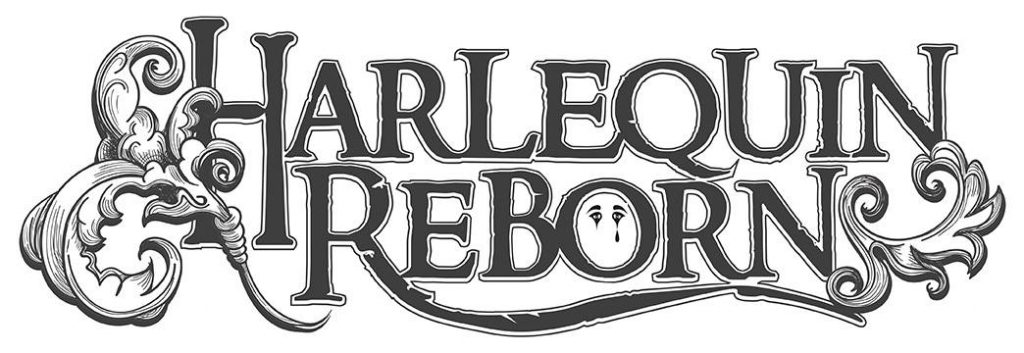
PoP:
Are you working on a release for Harlequin Reborn?
John:
We have worked on a release since 2015 but have abandoned our original idea to initially put out a live album. We scrapped that and are now well into a studio album. It will be called Scenes From the Harlequinade. I will return to the studio to finish it up after we wrap up all the final bits of the Sun King Rising project. We have not signed with a record company yet but are in initial talks.
PoP:
Are you planning a tour or select shows with either of the bands?
John:
We are just now working on some initial plans to do a couple of select gigs for Sun King Rising. SKR is substantially easier to organize for live performances than HR which is really limited to large stages due to the theatrics. Luckily, we do have a complete production company (led by my production manager, Jeff Schuffert, and our front-of-house genius Pat Benigas) that can handle quite a range of venues. Anything more than a short tour would be hard due to the burdens of day jobs etc. We would also be very interested in any festival work that may come our way once we are out of the plague season!
PoP:
What process is more magical, playing live and sharing your music or creating the magic of music?
John:
For me, it is the creative process. Writing the song, arranging it, and searching for that golden artistic spark is extremely satisfying.
PoP:
If you could put together a band of your idols (past or present) for a one-time album and tour, who would be a part of it and why?
John:
Leon would be playing the piano that is for sure. Maybe add Booker T on the organ! I’d like to have Ray Charles backup singers also! There are tons of great rhythm sections that I’d be happy with. On guitar, I’d want my cousin, Steve Schuffert, because he is as good as anyone I have ever heard.
PoP:
What ten albums should be in every seriously good music collection?
John:
I can’t do it. There are way too many. It changes daily for me! From a SKR perspective, I would have to include albums by Bob Dylan, Joe Cocker, Leon Russell, Randy Newman, Jimmy Web, Carole King, Laura Nyro, John Hiatt, William Topley, and Al Green.
PoP:
What’s the last album you listened to?
John:
The last three according to my Amazon music account are: Music for Piano, Voice and Chamber Ensemble from The Thomas De Hartmann Project, All in the Downs by the remarkable William Topley, and the Italian prog band Saint Just’s eponymous album, a little known gem from 1973.
PoP:
What makes you happy and what ticks you off?
John:
People being kind and thoughtful to one another makes me happy. A beautiful work of art or a great book also make me happy. Being with my friends, hearing live music, and playing music make me happy. Traveling the world makes me happy. Debussy’s harmonies make me happy. A fine champagne definitely makes me happy. Ignorance and greed tick me off. People who abuse children or animals enrage me. Bad drivers upset me. And bands who wear shorts and tennis shoes on stage (unless you are a drummer and then I’ll probably hide you behind tinted plexiglass)! Not being able to tell the band from the audience is a real drag for me, although I realize it is idiosyncratically shallow of me to reveal such sartorial contempt.
PoP:
What does success mean to you, not as a musician, but as a person?
John:
Success is reflected in the kindness and charity that you show others in need. I have been very fortunate in life. I try to help others, especially musicians when I can.
PoP:
How has the music landscape changed since you have become a professional musician?
John:
There are nowhere near as many live venues for young musicians to hone their performance skills and they don’t pay nearly as well as they once did. However, the ability to have high-quality recording technology in the home has benefited musicians by giving them greater access to audiences. The sheer amount of new music that is now available due to this technological egalitarianism is daunting, however.
PoP:
If you could put one thing back into Pandoras Box what would it be?
John:
The advent of software-based autotuning tools that have led people who should not be singing to put out records that are fit only for the demons of Gehenna to listen to.
PoP:
Do you see value in streaming services such as Spotify and YouTube for example?
John:
I don’t use Spotify but I often go first to YouTube when I’m checking out a new band or trying to find an old song. I like Bandcamp because they have an incredible variety of great music available and it is “close” to the source of the music, the musicians themselves.
PoP:
If you could perform anywhere in the world, where would it be? And who would be your warm-up act?
John:
My goal is to play in Europe, especially the UK and Italy. I am friends with lots of musicians, so I’d probably choose somebody local who complements whatever act I was touring. If it was a prog show, there is no doubt that I would want my good friends in This Winter Machine to play on the bill, although I think it more likely that we’d be warming up for them!
PoP:
What influences your songwriting?
John:
My mood, a painting that I see, or a nice lyrical phrase all can stimulate the process.
PoP:
What is the best advice you’ve been given professionally?
John:
Frankly, it was to go to graduate school because the likelihood of having a career in music was vanishingly small. Also, in my early years, someone suggested that I learn as much music theory as possible because it would greatly expand my musical palette. They were correct!
PoP:
What advice would you give to an aspiring musician?
John:
Make sure you get a good education that can provide you with the necessary expertise and a skill set that can help you have a sustainable career even if the ultimate focus is not music. Music will always be there to inspire.
PoP:
Have you ever thought about being something other than a musician? Oh, wait you do… you have a Ph.D. in Genetics. That’s some pretty heavy stuff, tell us a little about it?
John:
Ha! I am a professor of Human Genetics at the University of Texas Rio Grande Valley School of Medicine. I am a biomedical research scientist working in the area of the genetics of common complex diseases like heart disease, diabetes, psychiatric diseases, neurological diseases, and infectious diseases to name a few. My group does a wide variety of things including genome sequencing, stem cell biology, and the development of mathematical and statistical models to enhance discoveries relevant for advancing human health. I am far better known in science than I am in music! I’ve published about 700 peer-reviewed papers in the biomedical literature and have been fortunate to have been asked to give talks in more than 40 countries and all continents except Antarctica (still waiting for that invitation!). It has been a wonderful career that I have been very fortunate to have experienced. I also co-own a predictive data analytics company, 4TellX, that is based in Austin and that primarily works in the education space by helping school districts better understand and utilize their data to tailor education appropriate for individual students.
PoP:
Dare I ask your thoughts on the current situation of the Coronavirus (COVID-19)? How do you see this affecting the musician and the people of our planet in general?
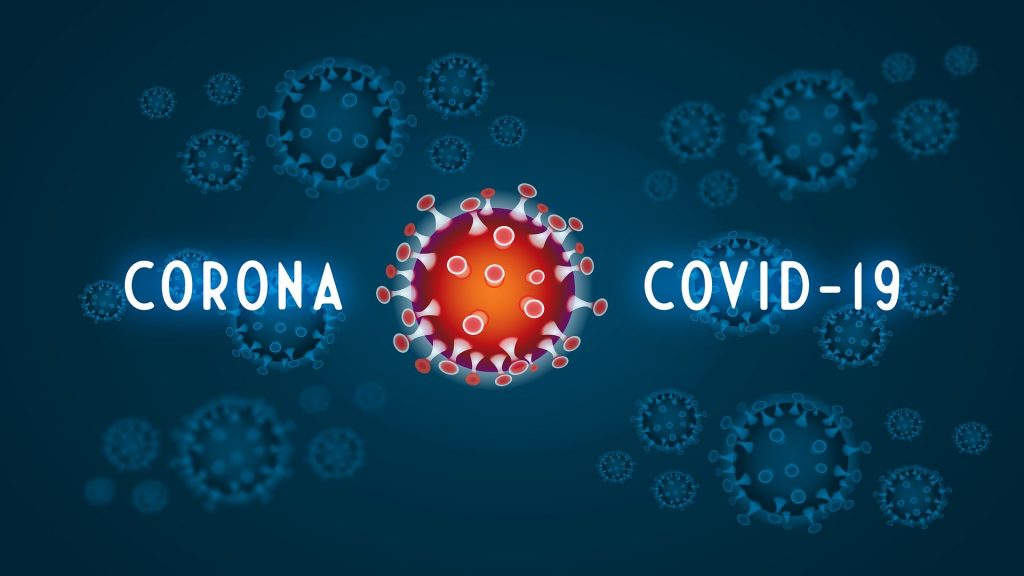
John:
It has certainly been an eye-opener to see how the planet can almost come to a stop due to an extremely simple organism. It has already been devastating to musicians who require live engagements to sustain their lives. In general, I think it is very scary for people and there is a lot of disinformation that would be less impactful if we did a better job at teaching the importance of scientific process and knowledge. I grieve for places like Italy that have been hit so hard. As a scientist, I am confident that we can quickly minimize the loss of life with existing treatments and then develop a vaccine that will reduce the potential for future outbreaks. I also have developed a project in the last few weeks for identifying human genetic variations that are contributing to the different responses that we see amongst individuals who are infected.
PoP:
In closing, I want to thank you for taking the time to do this interview with us. Do you have anything that you would like people to know that we did not talk about?
John:
I think it has been pretty wide-ranging! Thank you very much for the stimulating questions and this opportunity to introduce myself to your audience.
For more information
https://sunkingrising.rocks/
https://www.facebook.com/pg/SunKingRising/
https://peacocksunriserecords.com/sun-king-rising/
http://www.harlequinreborn.com/
https://www.facebook.com/HarlequinReborn/

